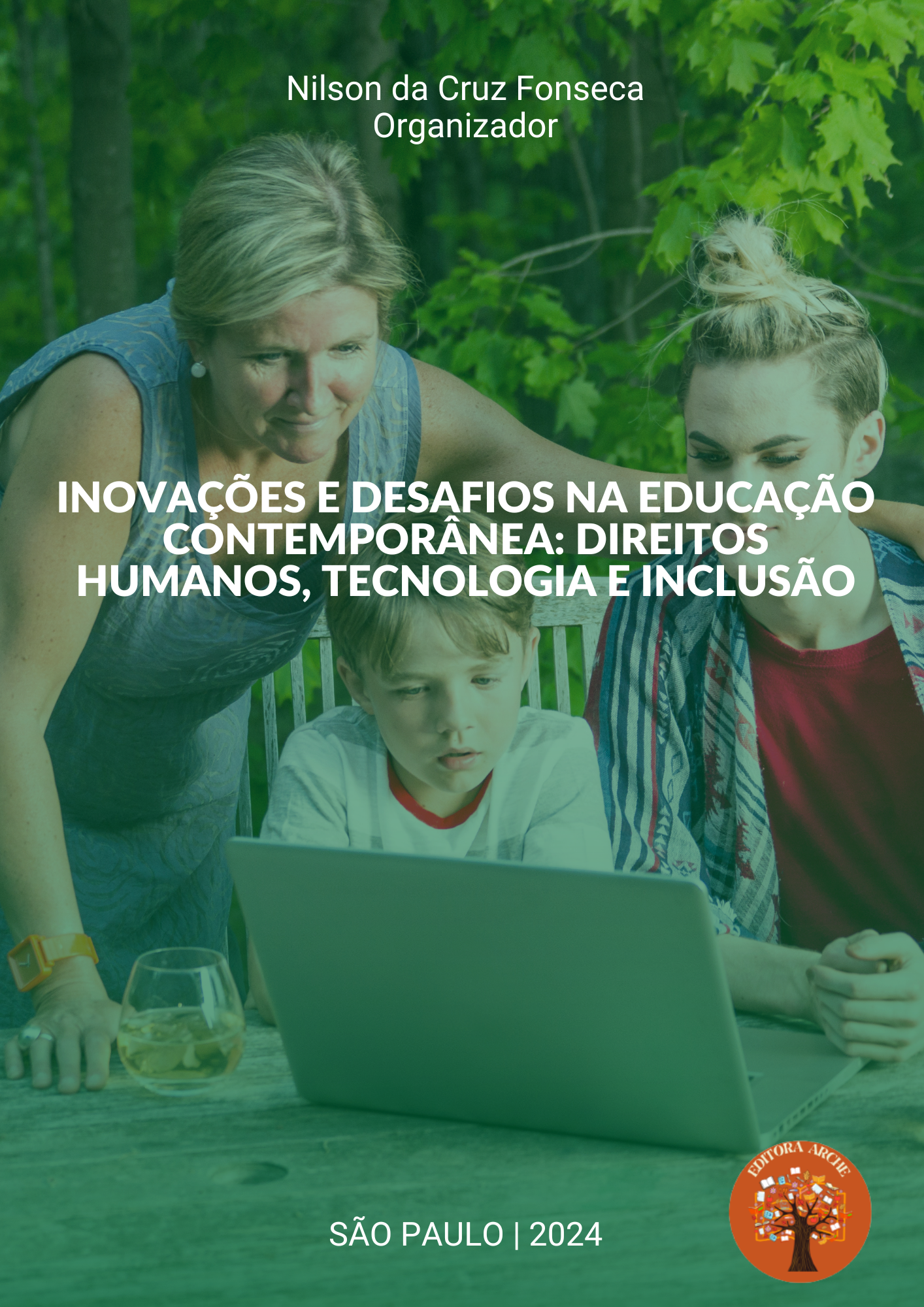INOVAÇÕES E DESAFIOS NA EDUCAÇÃO CONTEMPORÂNEA: DIREITOS HUMANOS, TECNOLOGIA E INCLUSÃO
Palavras-chave:
Gestão escolar. Direitos humanos. Inclusão. Justiça social. Equidade.Resumo
À medida que a educação contemporânea enfrenta desafios cada vez mais complexos, impulsionados tanto pelas demandas sociais quanto pelo avanço das tecnologias emergentes, torna-se essencial refletir sobre os caminhos que podemos trilhar para promover uma educação mais inclusiva, justa e inovadora. Em virtude disso, este ebook reúne quatro artigos que exploram, de maneira interligada, os principais, desafios e oportunidades que permeiam a gestão escolar, a inclusão educacional, a capacitação docente e o impacto transformador das novas tecnologias em nosso cotidiano. Dessa forma, busca-se com essas reflexões, uma melhor contribuição para o debate acadêmico, oferecerendo propostas práticas que possam fortalecer as diretrizez educacionais no Brasil.
No Capítulo 1, intitulado "Gestão Escolar e Direitos Humanos: Um Caminho para a Inclusão e Justiça Social", discute-se o papel fundamental da gestão escolar na promoção de uma educação inclusiva, baseada nos princípios dos direitos humanos. Ao longo do texto, são explorados, por exemplo, como a liderança escolar e as práticas de gestão democrática podem atuar como forças transformadoras na construção de uma sociedade mais justa e equitativa.
Nesse sentido, o capítulo reflete sobre os diversos desafios que os gestores enfrentam ao implementar políticas de inclusão e direitos humanos, além de propor estratégias eficazes para tornar a gestão escolar mais participativa, especialmente no enfrentamento das desigualdades sociais e estruturais presentes no sistema educacional brasileiro.
No Capítulo 2, "Capacitação Docente para a Era Digital: Competências e Estratégias Inovadoras", o foco recai sobre a necessidade urgente de capacitar os educadores para lidarem com os desafios impostos pela era digital. Em um cenário cada vez mais permeado por tecnologias, torna-se imprescindível que os docentes desenvolvam novas competências, não apenas técnicas, mas também pedagógicas, para que possam atuar com eficácia em ambientes educacionais digitais.
Além disso, o capítulo discute estratégias inovadoras de formação contínua para educadores, mostrando como essas estratégias podem ser implementadas para preparar os professores de forma mais efetiva. Dessa forma, o uso consciente e criativo das novas tecnologias pode ser promovido, transformando o processo de ensino-aprendizagem em algo mais dinâmico e adaptado às demandas atuais.
Entrentanto, o Capítulo 3, intitulado "Educação Inclusiva e TDAH: Superando Barreiras e Promovendo Sucesso e Acolhimento", aprofunda-se no desafio de incluir, de maneira efetiva, estudantes com Transtorno de Déficit de Atenção e Hiperatividade (TDAH) nas escolas brasileiras. Por meio de uma análise detalhada, são discutidas as barreiras, tanto acadêmicas quanto emocionais, que esses alunos enfrentam diariamente, bem como as estratégias necessárias para garantir que a gestão escolar e as práticas pedagógicas sejam adaptadas às suas necessidades específicas. Além disso, o capítulo enfatiza a importância de uma abordagem personalizada e inclusiva, que leve em consideração as particularidades de cada aluno, e ressalta a necessidade de conscientizar a comunidade escolar sobre o TDAH. Assim, busca-se garantir um ambiente que, além de acolher esses estudantes, promova seu sucesso acadêmico e seu desenvolvimento emocional.
Por fim, no Capítulo 4, "A Revolução da Inteligência Artificial no Ensino Superior: Transformações e Perspectivas", investiga-se como a Inteligência Artificial (IA) está revolucionando o ensino superior, transformando profundamente a forma como as universidades e faculdades operam e estão se adaptando a essa nova realidade da quarta revolução, que é a inteligência artificial.
Este capítulo examina, por exemplo, como a IA está possibilitando a personalização do ensino, ao mesmo tempo em que melhora a gestão acadêmica por meio da análise de grandes volumes de dados educacionais.
Tais avanços permitem uma tomada de decisão mais informada e eficiente. Ao mesmo tempo, o texto não deixa de abordar as questões éticas e sociais que surgem com o uso de IA, como a privacidade de dados dos alunos e os impactos da automação no trabalho dos professores.
Assim, o capítulo propõe uma reflexão crítica sobre como adotar essas tecnologias de maneira responsável e inclusiva, destacando que o uso consciente da IA pode tanto melhorar os resultados educacionais quanto reduzir desigualdades no ensino superior.
Portanto, cada capítulo deste ebook oferece uma contribuição única e relevante para o entendimento dos desafios e inovações que estão moldando a educação contemporânea. Ao mesmo tempo que os textos aprofundam questões teóricas e práticas, eles também propõem soluções viáveis para gestores, educadores e pesquisadores que buscam transformar suas práticas educacionais. Assim, espera-se que este material não apenas inspire reflexões profundas, mas também incentive ações concretas que possam promover uma educação mais inclusiva, inovadora e comprometida com a justiça social no Brasil.
Nilson Fonseca
Downloads

Downloads
Publicado
Como Citar
Licença
Atribuição CC BY
